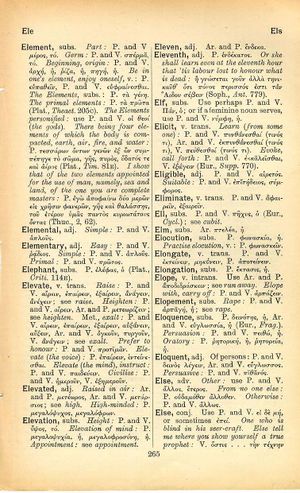element: Difference between revisions
Πέτρος Ἰουδαίοις τάδε πρῶτα τεθέσπικε πιστοῖς → Peter has laid down the following first writing for the Jewish faithful
mNo edit summary |
(nlel) |
||
| Line 10: | Line 10: | ||
<b class="b2">There being four elements of which the body is compacted, earth, air, fire, and water</b>: P. τεσσάρων ὄντων γενῶν ἐξ ὧν συμπέπηγε τὸ [[σῶμα]], γῆς, πυρὸς, ὕδατός τε καὶ ἀέρος (Plat., ''Tim.'' 81E). | <b class="b2">There being four elements of which the body is compacted, earth, air, fire, and water</b>: P. τεσσάρων ὄντων γενῶν ἐξ ὧν συμπέπηγε τὸ [[σῶμα]], γῆς, πυρὸς, ὕδατός τε καὶ ἀέρος (Plat., ''Tim.'' 81E). | ||
<b class="b2">I show that of the two elements appointed for the use of man, namely, sea and land, of the one you are complele masters</b>: P. ἐγὼ [[ἀποφαίνω]] δύο μερῶν εἰς χρῆσιν φανερῶν, γῆς καὶ θαλάσσης, τοῦ ἑτέρου ὑμᾶς παντὸς κυριωτάτους ὄντας (Thuc., 2, 62). | <b class="b2">I show that of the two elements appointed for the use of man, namely, sea and land, of the one you are complele masters</b>: P. ἐγὼ [[ἀποφαίνω]] δύο μερῶν εἰς χρῆσιν φανερῶν, γῆς καὶ θαλάσσης, τοῦ ἑτέρου ὑμᾶς παντὸς κυριωτάτους ὄντας (Thuc., 2, 62). | ||
}} | |||
{{nlel | |||
|nleltext=[[στοιχεῖον]] | |||
}} | }} | ||
Revision as of 17:00, 9 January 2019
English > Greek (Woodhouse)
subs.
Part: P. and V μέρος, τό. Germ: P. and V. σπέρμα, τό. Beginning, origin: P. and V. ἀρχή, ἡ, ῥίζα, ἡ, πηγή, ἡ. Be in one's element, enjoy onesolf v.: P. εὐπαθεῖν, P. and V. εὐφραίνεσθαι. The Elements, subs.: P. τὰ γένη. The primed elements: P. τὰ πρῶτα (Plat., Theaet. 205C). The Elements personified: use P. and V. οἱ θεοί (the gods). There being four elements of which the body is compacted, earth, air, fire, and water: P. τεσσάρων ὄντων γενῶν ἐξ ὧν συμπέπηγε τὸ σῶμα, γῆς, πυρὸς, ὕδατός τε καὶ ἀέρος (Plat., Tim. 81E). I show that of the two elements appointed for the use of man, namely, sea and land, of the one you are complele masters: P. ἐγὼ ἀποφαίνω δύο μερῶν εἰς χρῆσιν φανερῶν, γῆς καὶ θαλάσσης, τοῦ ἑτέρου ὑμᾶς παντὸς κυριωτάτους ὄντας (Thuc., 2, 62).

